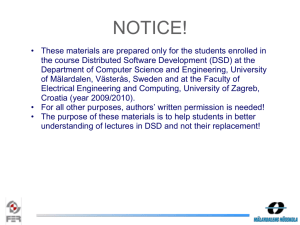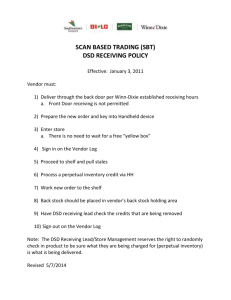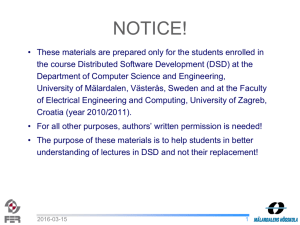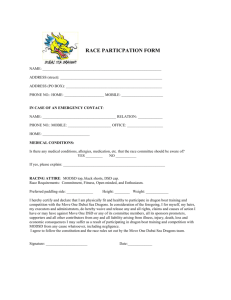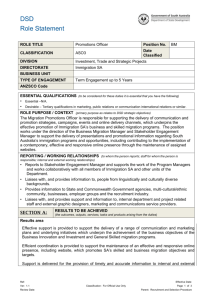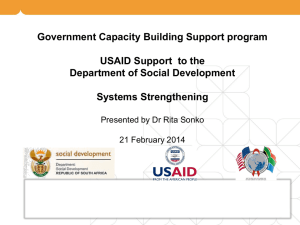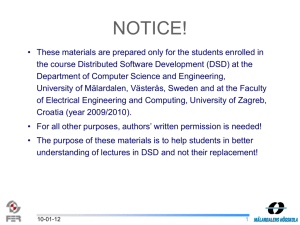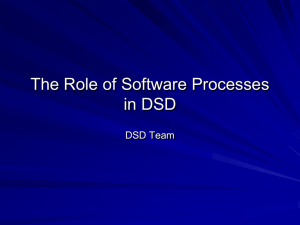INTERSEX Disorders of Sex Development (DSD)
advertisement
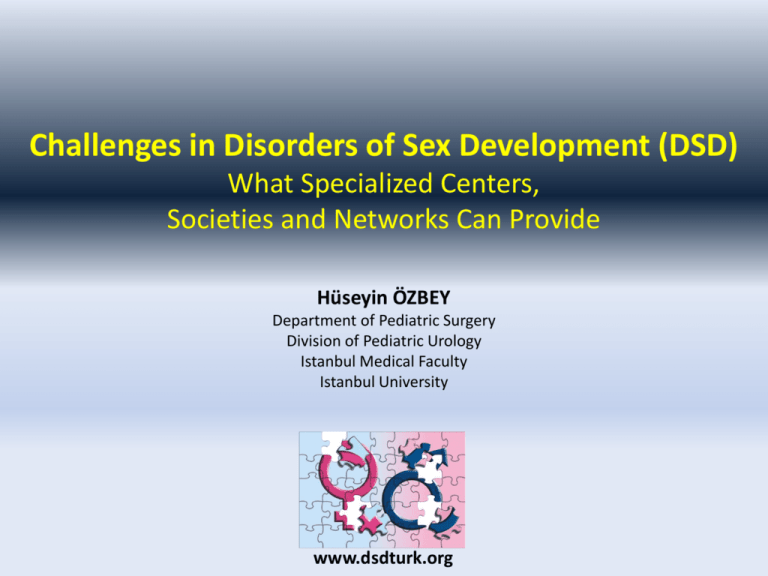
Challenges in Disorders of Sex Development (DSD) What Specialized Centers, Societies and Networks Can Provide Hüseyin ÖZBEY Department of Pediatric Surgery Division of Pediatric Urology Istanbul Medical Faculty Istanbul University www.dsdturk.org TERMINOLOGY “HERMAPHRODITISM” “AMBIGUOUS GENITALIA” “INTERSEX” “DISORDERS OF SEX DEVELOPMENT” (DSD) “DIFFERENCES OF SEX DEVELOPMENT” (DSD) Disorders of Sex Development (DSD) Congenital conditions with a mismatch of; genetic, gonadal, anatomical, psychological SEX “ATYPICAL SEX” Sexual difference The most characteristic difference of HUMAN BODY external genitalia Sexual difference The most characteristic difference of HUMAN BEHAVIOR gender identity & sexual orientation affected by the external genitalia! One in 300 - 4500 infants is born with abnormalities of the external genitalia DSD DIFFERENCES OF SEXUAL DEVELOPMENT wide range of variations from the statistically normal DISORDERS OF SEXUAL DEVELOPMENT need medical/surgical intervention XY-DSD XX-DSD Ovotesticular-DSD XX-male XY-female (gonadal dysgenesis) M. Caster SEMENYA (born 7 January 1991) South African runner and world champion Won gold in 800 metres at the 2009 World Championships Subjected to "gender testing“ Underwent gender verification Erik Schinegger (born 19 June 1948) Austrian skier and world champion in 1966 raised as female (Erika Schinegger) subjected to “gender testing” diagnosed as XY went under gender re-assignment & married, became a father Satiye’s fight for maleness (26) Now, his name is İsmail (25) (Milliyet, September 4, 2005) Hürriyet, December 30, 2009 Examples of external genitalia in patients with DSD CAH-E.K. CAH Examples of external genitalia in patients with DSD CAH-B.T. 5AR-D.A. Examples of external genitalia in patients with DSD XX-male, M.G. 17BHSD-G.L. Examples of internal & external genitalia in patients with DSD CAIS-C.E. Crossed testicular ectopia&PMD-A.A.G Sexual & behavioral differentiation Biologic sex chromosomes & genes & gonadal histology hormones & enzymes & factors & receptors Gender Gender identity (pre-postnatal hormonal effects; how a person views oneself as male (man) or female (woman), or (DSD) Gender role - behavior - orientation (play, wear, job, sports, physical agression etc; how a person is viewed by other members of society as masculine or feminine, and their erotic behavior) Genetic & Gonadal sex determination Sex determining genes on the sex chromosomes – SRY – DAX1 - Yp11.3 - Xp21.3 Sex determining genes on the autosomes – – – – – SOX9 DMRT1 SF1 WT1 Wnt4 - 17q24 9p24.3 9q33 11p13 1p35 More genes to be identified... to date, in about half of all patients with DSD can be genetically explained! Problems with DSD Sex of rearing Metabolic conditions Sexual function Fertility Risk of tumor development Gender panic! Gender panic: the fear of the “possibility of homosexuality” by the parents of children with “ambiguous genitalia”! DSD management Experienced & consulting multidisciplinary team (endocrinology, psychiatry&psychology, genetics, radiology, surgery) Laboratory (chromosomal analysis, SRY, molecular genetics, hormones, MIF, inhibinB, radiology, surgery, pathology) Follow-up and good communication (by each specialist) DSD Surgery EARLY (within the first year) LATE (after puberty) Goals of DSD surgery esthetic and gender-typical appearance un-obstructed urinary emptying without incontinence or infections good adult sexual and reproductive function DSD Surgery major (sacrifying) / minor (normalising) masculinizing feminizing orchidopexy urethroplasty removal of Müllerian ducts gonadectomy clitoroplasty vaginoplasty impaired body - genital image emotional trauma & ego loss infertility Urethroplasty (hypospadias) preoperative postoperative Urethroplasty (hypospadias) preoperative postoperative Urethroplasty (hypospadias) preoperative postoperative Urethroplasty & MD removal XX-male M.G. preoperative postoperative Clitoroplasty & gonadectomy 17BHSD-G.L. preoperative postoperative Gonadectomy PAIS- Clitoro-vaginoplasty (CAH) preoperative postoperative Informed consent for surgery Do parents have the authority to consent to genital normalizing and sex assignment surgery on behalf of their infants? the only person without consent is the patient himself or herself! Ethical ! ? Legal !? Diagnostic and long term treatment problems in DSD Unique challenge! Definition of the illness/situation Small sample sizes Lack of laboratory studies & experienced researcher Lack of accurate diagnosis •Genetic, clinical, neurological, psychosocial Lack of experienced surgeon Fertility issues Clinical problems in DSD Lack of experienced care provider! a different physician & new diagnosis additional and/or unnecessary laboratory analyses increased parental distress LIMITED TIME FOR CLINICAL AND LABORATORY EVALUATION DELAYED GENDER ASSIGNMENT! Clinical problems in DSD non-educated parents ! Disclosure of diagnosis needs strict confidence Decision making process (child) & family concerns informed consent psycosocial inquiry some parents consult and get informed some parents just let the situation be as doctors’ wishes Decision-making & therapy-planning process Multidisciplinary health-care team Good communication & collaboration Each case must be considered individually! Parents must have understood the planned interventions, their significance Cultural effects in DSD Attitudes towards sex of rearing in late (&early!) diagnosed patients with DSD in Eastern countries are very different from those in Western countries! 46,XX “male” - CAH It is extremely difficult to correct the gender of patients with f-CAH when they present at >2.5 years of age Gender assignment in female congenital adrenal hyperplasia: a difficult experience Özbey H, et al BJU Int. 2004 Aug;94(3):388-91 male offspring traditional breadwinner responsible for parental care carries family property (consanguinous marriage!) fear of social ridicule In eastern countries, cultural, economic and social factors are more important than sexual potential! DSD Societies & Support Groups www.isna.org www.ukia.co.uk www.xy-frauen.de AGS-Eltern- und Patienteninitiative e.V. www.ags-initiative.de www.bodieslikeours.org AISSG: Androgen Insensitivity Support Group www.aissg.org www.heainfo.org www.sindromedimorris.org DSD Societies & Support Groups Support groups Lübeck 2011 Support groups London 2011 DSD Networks www.orpha.net www.eurocat-network.eu www.eurodsd.eu www.netzwerk-is.de EuroDSD - consortium BHAM - The University of Birmingham CAU-Christian-Albrechts-Universität zu Kiel EUR- Erasmus Universitair Medisch Centrum, Rotterdam GABO:mi- GABO:milliarium mbH & Co. KG, München HCL-Hospices Civils de Lyon IPP-Institut Pasteur, Paris KI- Karolinska Institutet, Stockholm UCAM PAED - University of Cambridge UCL-University College London UNIPI- University of Pisa UOG- University of Glasgow UZL - Universität zu Lübeck WWU Muenster EuroDSD What Specialized Centers, Societies and Networks Can Provide ? National & International Clinical - Research Networks & Experts Collaboration with sharing •Data •Information •Experience What Specialized Centers, Societies and Networks Can Provide ? rapid clinical & laboratory evaluation early diagnosis peer support ends isolation and stigmatization increased experience & quality care help to find the best quality care INTERSEX One-day Symposium May 1, 2006 Istanbul www.dsdturk.org Milton Diamond, Professor University of Hawaii, John A Burns School of Medicine Pacific Center for Sex and Society Honolulu, Hawaii, USA Heino FL Meyer-Bahlburg, Professor NY State Psychiatric Institute Columbia University, New York, USA dsdturk www.dsdturk.org Cinsel Gelişim ve Hipospadiyas Derneği Sexual Development and Hypospadias Association
